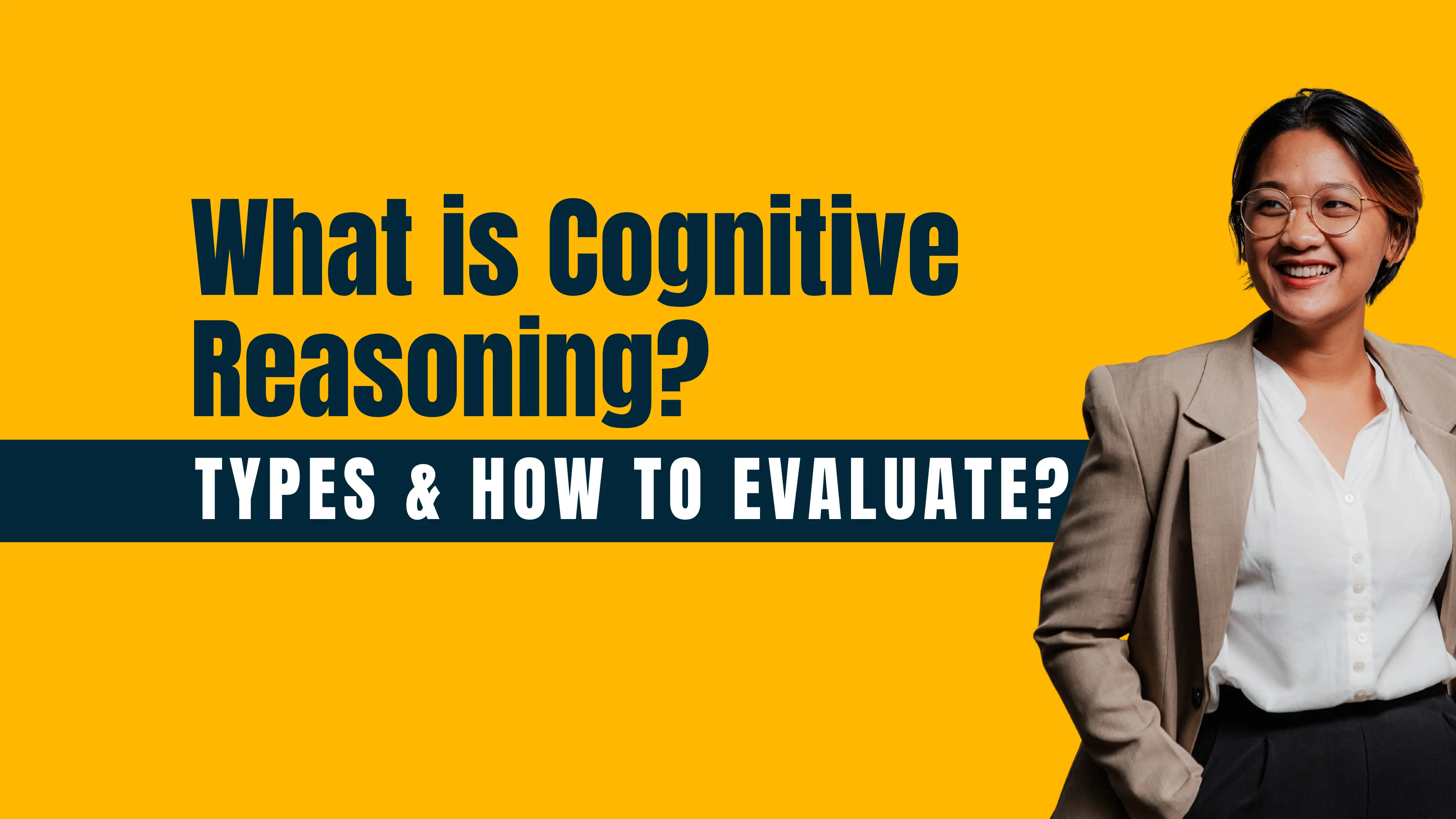In the highly dynamic job market of today, businesses need to build strong workforces that are capable of driving the organization amidst any kind of problems and challenges.
And, for this to happen, the recruitment strategy of the company must be robust and infallible, resulting in hiring the best suitable talent from the market. Talent assessment is a crucial tool that can help you hire the best people for your company so that you can easily achieve your organizational objectives.
Talent assessment is a type of test that helps identify an individual’s skills, knowledge, competency, and ability to perform a certain job at a company. Such a test is used to evaluate if a candidate is fit for an open job vacancy at the organization.
This is pretty handy in a situation when there are several potential candidates for a single open job position, with similar experiences and skills. In such a situation, an effective talent assessment strategy can help you decide which of the candidates suits the job position better.
What is a Talent Assessment Strategy?
Every job position requires a candidate to possess a combination of hard, soft, and trade skills. Evaluating all these types of skills through a single talent assessment method is impossible. Hence, every business needs to incorporate a talent assessment strategy to pick its potential hires from a pool of job applicants.
Talent assessment strategy consists of a variety of talent assessment methods, combined to hand-pick the best-suited talent for a job position. Though every different job requires a candidate to have a different set of skills, a company typically has a single talent management strategy or assessment method for identifying different skills to assess job applicants.
Types of Talent Assessments and Methods
As we mentioned earlier, every job requires the candidate to possess a combination of different skills. Therefore, there must be different assessment methods to identify different skills that an individual possesses.
Technical Skills Test
The technical skills test is usually an objective test that evaluates a candidate’s skills, knowledge, and expertise in a particular technology, coding language, or methodology.
This is usually the test that’s majorly important for a candidate to pass the talent assessment step of the recruitment process. That’s because these technical, hard, or job-specific skills are the most important ones that an employee would need to perform the roles and responsibilities of his job.
What’s great is that you can find several tools in the market that can help you not only create these assessments for the job applicants but also evaluate them and rank them on the basis of their performance. One such tool is offered by WeCP that can help accomplish the technical skill test for your job applicants without any human intervention.

Cognitive Ability Test
Cognitive ability tests help evaluate an individual’s critical and logical thinking, reasoning skills, problem-solving skills, decision-making skills, memory, and numerical aptitude. Though this test doesn’t include any of the job-specific skills, it can tell you how an individual is going to process and analyse a particular situation or a piece of information in order to make a decision. Such a test also assesses an individual’s general intelligence and ability to pay attention to details.
Personality and Culture Test
The personality and cultural fit of an employee with his organization was not necessary until about two decades ago. However, today, these things are very important for the company as well as the employee. Several studies also reveal that when the values and ethics of a company align with those of an employee, they tend to stay longer with the organization.
Therefore, various companies are now investing in assessing their job applicants on being culturally fit with the organization. This can be done by identifying the key personality traits of an individual using a culture fit test.
Language and Communication Test
Proper communication is the key to success. Thus, companies must evaluate the communication and language skills of their potential hires. Language proficiency tests also help to include more diverse candidates in a company.
These tests can be both objective and subjective, depending on the requirements of the job. Objective tests are more beneficial to understand the language proficiency of a candidate in comprehension and grammar while subjective tests help comprehend the candidate’s ability in expressing their emotions.
Situational Judgement Test
Such types of assessments help understand a candidate’s capability of handling different business situations. Questions related to business ethics, teamwork, conflict resolution, people management, negotiations, leadership, and other social situations are asked to understand how a candidate thinks or resolves problems.
Job Simulations and Trials
Job simulations and trials are a type of assessment where a candidate is assigned a real-world problem to solve or is asked to perform on a real-time basis while being placed in a real working environment with teammates and work pressure.
Such assessments are a great way to evaluate a candidate on their skills in realistic circumstances. This way, you can also judge their behavioral skills and team spirit.

Benefits of Talent Assessments
If talent assessment strategies are designed carefully, they should be able to recruit the best candidates with minimal resources and effort. These candidates should easily fit into the organization and should be fully equipped to meet the business objectives.
Elimination of Unconscious Biases
No matter how hard recruiters try, there is always a possibility of the introduction of unconscious biases. However, when these talent assessments are introduced in the hiring process, candidates are always qualified or disqualified based on their performance in the tests, rather than on their color, race, community, or gender.
Streamlining the Hiring Process
The use of various resources like money, time, and efforts of a lot of recruiters is saved when talent assessments come into the picture before the face-to-face interviews. This is because, once implemented correctly, talent assessments become easy and almost automated, making the hiring process streamlined.
👉 Read More: How Ness Digital Engineering Achieved Hiring Excellence with WeCP

Enhancing the Efficiency of the Hiring Process
The hiring process is called efficient when it uses fewer resources and produces good output, which means quality candidates at the end of the process. Since talent assessments allow only highly talented candidates to move further into the process, the final hire ought to be the best-suited candidate for the position, making the recruitment process highly efficient.
Enhancing the Company’s Employer Branding
Talent assessments during the hiring process make it more predictable for the employees. They know that their qualification or disqualification is dependent on their own performance in these assessments. This builds trust among the job applicants, enhancing the brand value of the employer. Better branding results in attracting more talented candidates for the vacant job positions.
How to Develop an Effective Talent Assessment Strategy?
Below are the steps to easily develop an effective talent assessment strategy.
Develop Clear Objectives and Criteria
Each job role is different and to understand what specific skills every job needs, you will have to talk to the individual hiring managers and identify what skills are crucial for their hires to have. The next step is to identify how to quantify these skills in your candidates.
Develop a Seamless Recruitment Process
An efficient and seamless recruitment process is sure to give you great hires who directly impact the growth of your organization. Hence, you should plan on which talent assessment methods should be used to measure the skills of job applicants for different job roles.
Some jobs might require the candidate to possess a lot of different skills while entry-level jobs would just need the candidate to have decent cognitive abilities.
👉 Read More: How UST Uses WeCP to Transform Candidates into Skill-Mapped, Project-Ready Talent
Set Clear Expectations from Your Talent Assessment Process
As a recruiter, you should be clear in your expectations from your candidates. For example, in the technical skill test, identify what score means below average for you and what means proficient.
An easier way to do so is by giving weightage to the different skill assessments, such as more importance to job-specific skills and less to leadership skills while evaluating a candidate for an executive role.
Examine the Results
The last but most important step is to shortlist the candidates for the next round. After reviewing the results of each of the participants, you can easily shortlist candidates for the next step of the hiring process.
However, one thing to note is that you need to be flexible with your numbers. For example, if you wanted to shortlist 5 candidates but 7 have performed pretty well in the assessments, you should be flexible and allow all 7 to go through the interview, rather than disqualifying the last 2 for no particular reason.
👉 Read More: How Mindtree Multiplied Its Engineering Talent with 90% Fewer Interviews

Factors to Consider when Choosing a Talent Assessment Strategy
Here are a few factors you should consider while developing a talent assessment strategy for your company.
- Most talent assessments come with a cost. The higher the cost that you invest in the assessment, the more information and automation it provides. However, introducing talent assessments is still a cheaper option because it is mostly a one-time investment to buy an assessment tool and get the recruitment staff trained on it. Later on, it saves several human hours and effort.
- If your company receives hundreds of CVs for every other vacancy, it is practically impossible to assess all these job applicants. Additionally, it is also impossible to get each CV read by a recruiter. Therefore, the best practice in such a scenario is to send them assessment to shortlist & filter unqualified candidates.
- Depending on the culture, logistics, and infrastructure of your organization, you can choose to conduct the assessments online or offline. There might be certain assessments that are not technically possible to conduct in the online mode, such as the job simulation test. Thus, such types of assessments are better kept for an in-person visit of the candidate.
Conclusion
Talent assessments are a great way to hand-pick the best talent from a pool of candidates. And, for this to work for you, you must implement a good talent assessment strategy. A streamlined assessment strategy is designed to shortlist the candidates based on their job-specific skills.
WeCP offers a skill assessment tool that can help conduct tests, evaluate participants, and rank them according to their performances. The tool helps you evaluate the hard as well as soft skills of your job applicants and make an informed recruitment decision.
Want to know more on how WeCP can help you out? Try WeCP for free or Schedule a Call with us.



.png)








.svg)